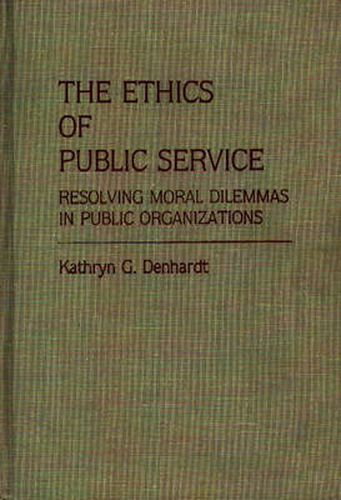Readings Newsletter
Become a Readings Member to make your shopping experience even easier.
Sign in or sign up for free!
You’re not far away from qualifying for FREE standard shipping within Australia
You’ve qualified for FREE standard shipping within Australia
The cart is loading…






This ground-breaking volume offers a theoretical framework from which the theory and practice of ethics in public administration can be guided. Starting with the most prominent literature in the field, it constructs a theoretical foundation for administrative ethics by building on the twin themes of organizational setting and individual administrator. Stressing that the field has failed to take advantage of the philosophical traditions that should be the underpinnings of any study or application of ethics, the volume focuses not only on the current state of public administration, but stresses the role of philosophy. The proposed framework is examined in light of philosophical traditions and in terms of how it fits with the role and context of public administrators in the general society. The book takes a practical approach, with emphasis on the exigencies of the environment in which public administrators must practice. The shortcomings of current approaches to public administration ethics are addressed, and alternative approaches proposed. Finally, the study examines the validity of the framework and the suggestions of earlier chapters by applying them to a specific case that might be faced by an administrator.
$9.00 standard shipping within Australia
FREE standard shipping within Australia for orders over $100.00
Express & International shipping calculated at checkout
This ground-breaking volume offers a theoretical framework from which the theory and practice of ethics in public administration can be guided. Starting with the most prominent literature in the field, it constructs a theoretical foundation for administrative ethics by building on the twin themes of organizational setting and individual administrator. Stressing that the field has failed to take advantage of the philosophical traditions that should be the underpinnings of any study or application of ethics, the volume focuses not only on the current state of public administration, but stresses the role of philosophy. The proposed framework is examined in light of philosophical traditions and in terms of how it fits with the role and context of public administrators in the general society. The book takes a practical approach, with emphasis on the exigencies of the environment in which public administrators must practice. The shortcomings of current approaches to public administration ethics are addressed, and alternative approaches proposed. Finally, the study examines the validity of the framework and the suggestions of earlier chapters by applying them to a specific case that might be faced by an administrator.